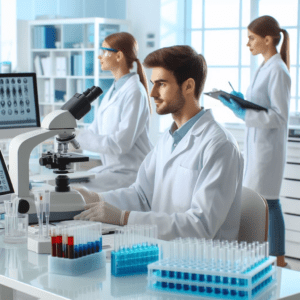The Diploma in Medical Laboratory Technology (DMLT) program is designed to train individuals in the principles and practices of medical laboratory science. Medical laboratory technologists play a crucial role in the healthcare system by performing various laboratory tests to assist in the diagnosis, treatment, and prevention of diseases. This diploma program provides students with the knowledge, skills, and hands-on experience necessary to work as competent and proficient laboratory technicians in medical laboratories, hospitals, clinics, research institutions, and public health facilities.
- Basic Sciences:
Students study foundational concepts in biology, chemistry, and anatomy and physiology to develop a strong understanding of human biology and the scientific principles underlying laboratory testing. - Medical Laboratory Procedures:
This segment covers laboratory techniques and procedures used in the analysis of various biological specimens, including blood, urine, tissue, and body fluids. Students learn about specimen collection, processing, analysis, interpretation of results, and quality control measures. - Clinical Chemistry:
Students learn about the analysis of blood and body fluids for diagnostic purposes, including tests for glucose, cholesterol, electrolytes, enzymes, hormones, and drugs. They gain skills in using automated analyzers, spectrophotometry, chromatography, and other analytical techniques. - Hematology:
Students study the cellular components of blood and their role in health and disease. They learn to perform hematological tests, including complete blood count (CBC), coagulation studies, blood typing, and blood smear examination, using manual and automated methods. - Microbiology:
Students learn about the identification and characterization of microorganisms, including bacteria, viruses, fungi, and parasites. They study microbiological techniques such as culture, staining, microscopy, serology, and molecular diagnostics for the diagnosis of infectious diseases. - Clinical Immunology and Serology:
Students learn about the immune system and its role in health and disease. They study serological tests for the detection of antibodies, antigens, and immune markers, as well as immunological techniques such as ELISA, immunofluorescence, and flow cytometry. - Clinical Pathology:
Students learn about the pathological changes associated with various diseases and conditions. They study cytology, histology, and histopathology techniques for the examination of cells and tissues, as well as molecular pathology techniques for the detection of genetic mutations and biomarkers. - Laboratory Management and Quality Assurance:
Students learn about laboratory management principles, including workflow management, inventory control, equipment maintenance, and safety protocols. They study quality assurance measures, accreditation standards, and regulatory requirements for medical laboratories. - Clinical Practicum:
Hands-on clinical experience is an integral part of the curriculum, allowing students to apply theoretical knowledge and develop practical skills in real-world laboratory settings. Clinical rotations take place in medical laboratories, hospitals, clinics, and research laboratories under the supervision of experienced laboratory technologists.
- Medical Laboratory Technologist:
Working in hospital laboratories, clinical laboratories, diagnostic centers, or research laboratories, performing laboratory tests, analyzing specimens, and reporting results to assist in the diagnosis and treatment of diseases. - Laboratory Supervisor/Manager:
Assuming leadership roles in laboratory management, overseeing laboratory operations, managing staff, ensuring quality control, and implementing quality improvement initiatives to enhance laboratory performance and patient care. - Phlebotomist:
Specializing in blood collection techniques, venipuncture, and specimen handling, and working in hospital phlebotomy units, blood banks, or outpatient clinics to collect blood samples for laboratory testing.
Research Technician:
Working in research laboratories or academic institutions, assisting scientists and researchers in conducting experiments, collecting data, analyzing results, and contributing to scientific discoveries and advancements in medical science. - Quality Assurance Specialist:
Specializing in quality assurance and regulatory compliance in medical laboratories, ensuring adherence to accreditation standards, regulatory requirements, and best practices for quality management and patient safety. - Infection Control Officer:
Monitoring and controlling infections in healthcare settings, including hospitals, clinics, and long-term care facilities, through surveillance, education, and implementation of infection control protocols to prevent healthcare-associated infections.
The Diploma in Medical Laboratory Technology program prepares students for rewarding careers in medical laboratory science. By mastering the principles of laboratory testing, clinical techniques, quality assurance, and laboratory management, graduates play a vital role in healthcare delivery, supporting clinicians in the diagnosis, treatment, and prevention of diseases, and contributing to improved patient outcomes and public health.
